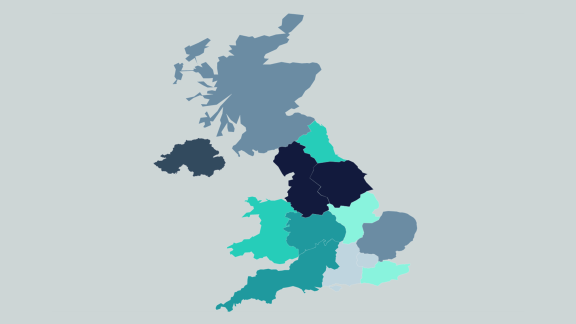A collaborative approach to improving international colleague retention

Prior to its merger with Somerset NHS Foundation Trust (SFT) in 2023, Yeovil District Hospital NHS Foundation Trust (YDH) had been on an international recruitment journey and had placed almost 4,000 nurses and allied health professionals in trusts across the UK since 2017, including itself. Following the merger, Somerset NHS Foundation Trust is now a recruitment collaboration, listed on the Ethical Recruiters List, meaning it has partnered together to pool resources to recruit candidates for vacant positions within that collaboration.
Key benefits and outcomes
- 3.8 per cent reduction in total leavers across both trusts since July 2022.
- 5 per cent reduction in sickness absence due to stress and anxiety.
- As part of the We Are Compassionate and Inclusive area of the People Promise, SFT has revised its leadership development programme to specifically support cultural competence, civility and allyship, as well as other leadership development topics.
What the organisation faced
When the new international recruits began to arrive, both YDH and SFT found that nurses lacked support wards and departments to support their integration.
During COVID-19 in 2020, many of the recruits were impacted by the lack of support due to the restrictions put in place, and they were subject to minimal contact due to the social distancing and isolation rules.
What the organisation did
In 2022, as part of its international recruitment programme, Yeovil spent three weeks in the Philippines conducting interviews where 5,000 individuals were interviewed in three different cities.
In the same year, Yeovil and Somerset Foundation Trust developed the retention roadmap in preparation for the imminent merger between the organisations, to address some concerns for the organisations with their international staff, which were leavers with under five years of service, staff turnover rate, work-life balance and pay and reward.
YDH and SFT became one of 23 organisations nationally to take part in the People Promise Exemplar Programme. This programme was designed to focus on improving the experience of working in the NHS for colleagues and improving overall retention. Once detailed analysis had taken place about potential areas of improvement, the trusts developed the Retention Roadmap, with the ambition to retain, develop, inspire and attract by driving engagement through their leaders.
YDH and SFT worked on pastoral support for the new recruits to ease their transition to the UK and to help them feel more welcome and settled. This work included pre-arrival webinars explaining next steps living and working in the UK and supporting international colleagues with housing options once their time in trust accommodation was coming to an end. It also included information on opening bank accounts, tours of the towns, and a who’s who and what’s what guide of Somerset, including doctor surgeries and school details, as well as much more.
YDH set up a mentor and buddy scheme for international senior recruits joining the organisation who were trained overseas and did not feel preceptorship was right for them, due to their previous experience in nursing. YDH also addressed the different ways of working as the recruits needed to understand the potential cultural differences they may experience working in the NHS in the UK.
The organisation also introduced a self-rostering system to allow all ward staff to work together and build their rotas. Allowing colleagues to be able to self-roster has been received positively and the trust is promoting opportunities with flexible working at the early stages of recruitment.
Post merger, SFT has started to develop coaching opportunities and shadowing of leadership team members. The organisation has also undertaken a campaign to see the person behind the uniform, with this is me boards within wards and a wider see me first campaign. Somerset also carries out regular drop-in clinics for colleagues and senior leadership walk arounds.
Somerset now holds a transfer window quarterly where registered nurses, nursing associates, allied health professionals, and assistant practitioners are given the opportunity to request another vacancy within the trust at their current banding without having to go through the full interview process. This is a popular development opportunity with overseas nurses who are wanting to move to a more desired department within their skill set. The application for a transfer is reviewed by a team of people who ensure that the movement does not have a negative impact on clinical areas.
Results and benefits
Colleagues working in areas where self-rostering has been introduced report feeling a greater sense of control and flexibility and in some cases it has reduced the need to put in formal flexible working requests.
The drop-in clinics and senior leadership walk arounds have led to greater visibility of some of the senior leadership team and an opportunity for colleagues to share concerns, queries and their views, meaning that colleagues feel heard more.
The trust now performs regular pulse surveys and has noticed an increase in responses relating to moral and an overall reduction in sickness absence rate. It also holds exit interviews when staff move to another service or leave the trust to get feedback. The exit interview process is ever evolving, and feedback has been provided that some colleagues may be more willing to share their views if they had the opportunity to speak to someone independent. A working group has been set up to review the options and opportunities with exit interviews.
Many of the international recruits have been able to continue their careers within the organisation by working towards band 7 and 8a roles.
As part of the People Promise Exemplar Programme, pastoral support was fundamental in improving the experience of colleagues recruited internationally to improve the experience, confidence and ability to apply and be offered roles at a higher level. Between 2023 and 2024, the medical service group, which trailed an alternative interview method of providing the interview questions before hand, saw a 7.5 per cent increase in representation of colleagues from an ethnic minority background in band 6 positions.
Overcoming obstacles
The organisation noticed that staff were facing problems understanding language, different terminology and cultural differences between domestic and international staff. For example, there was a difference in how the international staff would prepare patients who had died for transportation off the ward, so in response, international staff were shown the way in which the domestic staff transfer patients and explained why this was done. There were also misunderstandings when domestic staff would ask international nurses if they were okay, as this would be misinterpreted as if something was wrong. To overcome this, the organisation set up exercise to allow the staff to get to know each other more, including team building days with the inclusion lead and the Black, Asian, and Minority Ethnic Strategic Advisory Group (BAME SAG) lead for the Southwest, alongside the trust’s leadership and organisational development service.
A common discussion within the trust is how can it support international candidates that have joined the organisation, who are married or in relationships, to balance their shifts across areas of the trust, to support their work life balance and childcare needs. Ward managers will often work with other areas across the trust to ensure wherever possible, shifts can be aligned to support colleagues to balance work between them.
Future plans/next steps
Following the success of the transfer windows for nurses, the organisation is setting up transfer windows for healthcare assistants at band 3 who have been in their role for a minimum of 12 months – this will give them the opportunity to consider other vacancies in the trust at a band 3 level and allow them to move into a new or different position that they may want to work in.
Existing overseas staff are coming forward to work on induction programs to help develop them in workstreams depending on where the recruits have travelled from. They’ve also shared that they want to include more on culture and language in the UK, as there is still a gap in knowledge for new overseas recruits in this area.
Somerset continue to appear on the Ethical Recruiters List by maintaining their obligations and abiding the guiding principles of the Code of Practice for the international recruitment of health and social care personnel in England.
Top tips
Have existing overseas colleagues support the induction program by sharing insights, recommendations and their own journeys.
Nominate a mentor or buddy to the new overseas staff from day one.
Create drop-in sessions to discuss all housekeeping related concerns.
Offer self-rostering, flexible working, personal development plan, coaching to new starts where appropriate.
Adapt the interview processes to level the playing field for all colleagues, for example, providing all interview questions to candidates in advance to allow them to prepare.
Further information
For more information regarding this case study, please contact Holly Larcombe, head of colleague experience at Somerset NHS Foundation Trust, via Holly.Larcombe@SomersetFT.nhs.uk.


